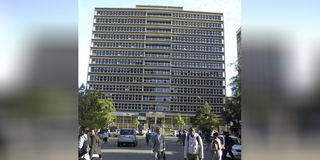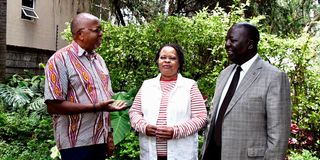Premium
A broken system: Pension mirage at Bima House where retirees hope in vain

Bima House along Harambee Avenue at the Taifa Road junction in Nairobi. The building houses the government pensions processing offices.
What you need to know:
- The predators preying on innocent retirees know when to pounce –just when the prey’s patience is waning.
- The amount of money you fork out to the brokers depends on the amount of pension you stand to get.
- To the dozens of pensioners, the design of the Bima House building and the placement of the offices on the different floors were intentionally done to frustrate them to allow the brokers have their cut.
Also Read:
Duke Omano has walked countless times in and out of Bima House, the government pensions processing offices, for the past three years.
Each time he walks in, he always hopes for a different outcome. But the feeling of anger and disappointment he had when he made his first steps out of the Bima House remain.
His retired father who worked with the Ministry of Irrigation is meant to be enjoying his retirement in peace, but he cannot. In his prime, his dad served the people of Kenya and saved for retirement, working in the quality control department in the ministry of irrigation until 2018 when he retired.
Also Read: Tales of burdened Kenyan retirees
His last posting was in Nandi County.
He has lost count of the trips he has made to the premise. But the last time he was there, he was told that the process was in its final stages of processing.
But whether – or if – that will happen is a game of chance. If it does come to fruition, it will end the years-long process.
But at a time when he should be enjoying and whiling away his retirement days, he only thinks of when he’ll ever receive his first payment.
Also Read: Treasury is to blame for delayed pensions
Omano’s father worries that he may “never taste the fruits of his labour” in retirement. He had saved for his sunset days as these, but the officials at the pensions department are keen on denying him what is rightfully his.
Bima House, which is is frequented by tens of senior citizens, is home to the Treasury’s pensions department whose mission is “To ensure the timely, efficient and effective payment of pensions, gratuities, and other benefits to eligible employees of the Kenyan public service so that they enjoy a dignified and secure livelihood in retirement.”
The oxymoron of this statement can, however, be felt from the looks on the faces of pensioners on their way out of this building.
Efforts by the Nation to get a comment from the Pensions department were unsuccessful, as an official in the Communications office said he was out on a retreat and would only respond once back in office.
When Mama Jane walks out of Bima House, one can read disappointment all over her face.
From the hesitant steps she makes down the stairs, with her daughter besides her, she is a woman tittering on the brink of hopelessness and dejection. She has made over a dozen trips to the house towering behind her.
Her children are meant to join college, and she had pegged all her hopes on her retirement savings.
“I have with me here, all the documents that are needed. But I don’t have the magic to unlock the stalemate,” she told the Nation as tears lingered in her eyes.
She has been here so many times that she even knows some of the staff of the pension’s department from the streets.
For every round-trip to the city from Migori, the widow parts with more than Sh3,000.
“Yet, nothing substantive comes of the visits,” she said, “I don’t know for how long I will keep coming here before someone sees sense in processing the money.”
Nelson Nyakundi, the firstborn of four siblings, has made it a routine to pass by Bima House every fortnight. His father died and for the last two years, he has been following up on payment of his dues. But now, the situation is worse, he says, any delays in the disbursement is immensely hurting them.
“My three siblings’ fees are in arrears. Every time I come here, it is always amendments on the date of death yet they have a copy of the death certificate with them. I wonder why they keep doing this to me,” a frustrated Nyakundi said on his way out of Bima House, adding that he also has outstanding arrears on his college payments.
He plans to use part of the money to settle his fees.
“My younger sisters too are finding it difficult to get through education,” Nyakundi shares from the waiting lounge at Bima House. Beside him are five others who share the same struggle.
The waiting lounge area, an almost-square space on the right of the building and directly opposite the reception desk, can accommodate 15 seated people. At any given time the Nation team visited the premises the holding place was full, the faces dull and gloomy.
From the moment Mzee Chacha Mwita emerges from the reception and turns his back to the receptionists as he wearingly paces to the waiting lounge, he looks tired, if not disappointed. It is only 10am in the morning. But tens have walked from the very counter with similar facial expressions.
The disappointment written all over the faces is an open secret that most — if not all of the senior citizens who walk into the building are usually treated to.

Association of Former International Civil Servants Kenya (AFICS) President Ambassador Dr John Kakonge (right) confers with AFCIS Deputy President Prof Linda Ethangatta and AFICS Member Michael Mwangi (left) during an interview on September 12, 2023 at Cedars Restaurant.
From the outside, Bima House gives the vibe of a building with order. With its entrance almost directly opposite Taifa Road, it seems more like an extension of Taifa Road. To the right of the building is the exit. Most people who walk through this gate are old and trying to get their pension issues sorted.
But between the exit and the adjacent building is a narrow path that leads to the back access of the building. This is the alternative entrance into the building that the proxies of the corrupt officials inside the building use to access the premises. From the back end, you need names of an official to get in, and the “fixers” know it. A few metres in is a “special” lift. This is the exact spot where deals are sealed, our informer told us.
Having made numerous trips to the premises, the pensioners are always asked to use this route to “meet some who’ll hasten the process”. Their predators know when to pounce –just when the prey’s patience is waning, our source explained.
It is always a gentlemen’s agreement and no formal agreements are signed. So long as both parties are happy.
The amount of money you fork out depends on the amount of pension you stand to get.
And voila, the file that may have or was taking too long to fix would be sorted in just a few hours.
But this worrisome trend is nothing new, according a report by the Kenya Anti-Corruption Commission, now Ethics and Anti-Corruption Commission, directorate of preventive services published in February 2008.
Pensioners had more than 15 years ago, according to the report, complained that requests for change of payment points were not always honoured. In some instances, the payment of pension is stopped altogether when a client sends a request for change of pay point, and reinstatements into the payroll and payments of arrears accrued never happens, the report observed.
The report of the examination into the policies, procedures and practices of the pensions department in the ministry of finance further said that the old were exploited by brokers and other intermediaries within the pensions department.
The EACC team had observed that some of the workers wait for the pensioners at the duty office and listen to the issues which concern particular pensioners, they accost them and promises to fast track payments. This is the same fate that is about to befall Sara Mueni Katuli, who we encountered on one of our visits to Bima House.
“The organisation of offices at Bima House is confusing, for instance, claims are received on the Mezzanine floor and then taken to the sixth floor for sealing and serialisation. The movement sometimes leads to loss of documents which is a major complaint from pensioners. In addition, the mail office is located on the mezzanine floor whereas the registry, from where the mail is stamped and distributed is on the third floor,” the report stated. This situation has remained the same.
To the dozens of pensioners we talked to, including the provision of a special ‘lift’ where deals are made to fast-track one’s claims, the design of the building—and the placement of the offices on the different floors—were designed to frustrate them to allow the brokers have their cut.
There is also the inordinate delays and time it takes for a processing to be done.

Some 12,290 public servants retireed in 2023 increasing ordinary pension payments by Sh8.3 billion. The amount of money pensioners fork out to the brokers at Bima House depends on the amount of pension they stand to get.
“Processing of a claim goes through approximately 15 steps. At each one of these stages, individual officers check the documents all over again. Despite these numerous checks, some files are returned back for correction even at the approval stage. Some files take very long in one section particularly when there is no one to follow up on them,” the EACC report noted.
EACC also noted that even at the very end of the process, the department makes fatal errors like wrong account name, wrong pay point, and wrong bank, among others.
“This occurs even when pensioners have provided correct information to the department when this happens, banks return payments which are taken to another department. This section waits until the petitioners goes up to follow on the payments, instead of providing the correct details,” the report said.
In some instances, the report said, some workers fraudulently substitute forms indicating preferred pay points by the retirees long after the approval stage, and “this fraudulent substitution is facilitated by the fact that once the bank effects payments, it is impossible to recover the money paid out.”
As it was 15 years ago when the report was compiled, nothing – or little – has changed about the setting.
The EACC report also observed that it sometimes takes excruciatingly long time for a claim to be processed without assistance either internally or externally.
When this happens, such files are tagged with red stickers as a sign that they should be prioritised for action.
“This creates a loophole for corrupt practices as pensioners have to follow their claims from one stage to another,” the report read.
For Sara who retired in 2017 from her teaching career, she received her pension until recently when she applied for a pay point change. Her pension payment was instead stopped, in a twist that she is at pains to understand.
She travelled from Runyenjes to Nairobi to sort out the matter when she spoke to the Nation. She had changed her point of pay (this is the bank that the money would be channeled through).
She was expecting that by the end of July, the payment would have reflected in the new bank. When that did not happen, she came all the way to understand what caused the delay. The finding was shocking:
“I was told that the ‘pay point change’ had been stopped by an officer in Bima House. But I was not told by who and why and until when the change had been halted,” she narrated, adding that she was greatly inconvenienced by the decision.
On both visits, she was sent to the first floor to meet some now-specific officer.
In that very office she had been told that everything was okay when she initiated the process and “had been put in the system”, on her subsequent visit, she was told that everything had been stopped.
When she pressed for answers that were not forthcoming nor convincing, shocked and fuming with fury, she walked down the stairs and left the building.
“Once the bombshells such as these are served upon the pensioners, it is then that the officers fly the offer of having to bribe for assistance,” the informer said, adding “it is just the beginning of the Ping-Pong game and she is likely to give in to this trick.”
It is an old trick that works wonders.
Being pounced on by officers of money for assistance.
Offices and departments at Bima House are organised in different floors, each serving a different purpose.
On the 11th floor is the claims office where all files from the various ministries are received. Between the first floor and the ground floor which serves as the reception, is the mezzanine floor that handles claims.
The first floor houses the registry. The second floor has the assessment department. The third floor has the audit and military officers.
The fourth floor is divided into two wings and houses two departments. On the right is the payroll department. On the left is the “voucher authority and preparation” department. This is the heart of corruption in the building because “for pensions to be disbursed, they must pass through here and the staff here, through proxies, knowhow to bait the pensioners.
On the fourth floor, the “corruption den” as our informer calls it, pensioners and staff speak in low tones. So low that eavesdropping does not yield much. It is especially low during the sealing of deals.
The fifth floor has the voucher approval, cash office, IT, and dispatch departments share this workspace. The sixth floor is where the bosses sit, according to our insider who explained that: “perhaps this is the only floor whose employees would not be netted if you bait them with money on a random day because they seldom interact with the disgruntled pensioners.”
At least, in all the offices, there are heaps of files that can be seen from the moment one accesses the various floors. And the files are sorted manually. The staff here are mostly in blue and white aprons.

To the dozens of pensioners, the design of the Bima House building and the placement of the offices on the different floors were intentionally done to frustrate them to allow the brokers have their cut.
The haze and maze that is the confusion continued and on behalf of pensioners across the country, the former Busia County Women representative Florence Mutua petitioned the parliament to look into the treatment of pensioners at Bima House. The committee on finance and national planning chaired by the then Homa Bay Women representative Gladys Wanga took up the matter.
Ms Mutua told the committee that: “contrary to expectation, most senior citizens are forced to make multiple, non-ending and fruitless follow-up visits to Bima House upon retirement in a bid to secure pensions rightfully due to them after many years of serving the public.”
In some instances, she said that regrettably, the pensioners end up dying without having obtained their pensions for which they toiled for years, leaving the next of kin in squalor, in addition to making them vulnerable to unscrupulous pension officers who contest their kinship and delay the pension payments even further.
Further, the former legislature said that the auditor general’s report on the pensions department had repeatedly recommended the urgent reorganization of the department in view of the perpetual inefficiencies, bottlenecks, and unnecessary bureaucracies that continue to cause multiple inconveniences, complaints, and outcries from the pensioners and their families.
The committee, however, gave the Treasury and the Pensions Department a clean bill of health. While indeed Bima House continued to ill. However, the very concerns the petitioner raised a year ago still persist.
Sometimes, however, it always a case of the employers failing to remit the deductions that in the long run result in the days upon retirement.
The Retirement Benefits Authority (RBA) last year flagged the amount of pension cash that employers are deducting from employees but not remitting to schemes had ballooned to Sh41.8 billion.
This spells doom for thousands of workers who face life in retirement without the cash.
However, for as long as the modus operandi of the pension department does not change, the steps of the exit of Bima House will continue hurling curses — spoken and unspoken — to the staff of the pension department.
Also Read:
Have you been frustrated while seeking government services? Would you like to share your story? Please get in touch with us at [email protected]. Use “Feedback” as the subject.





